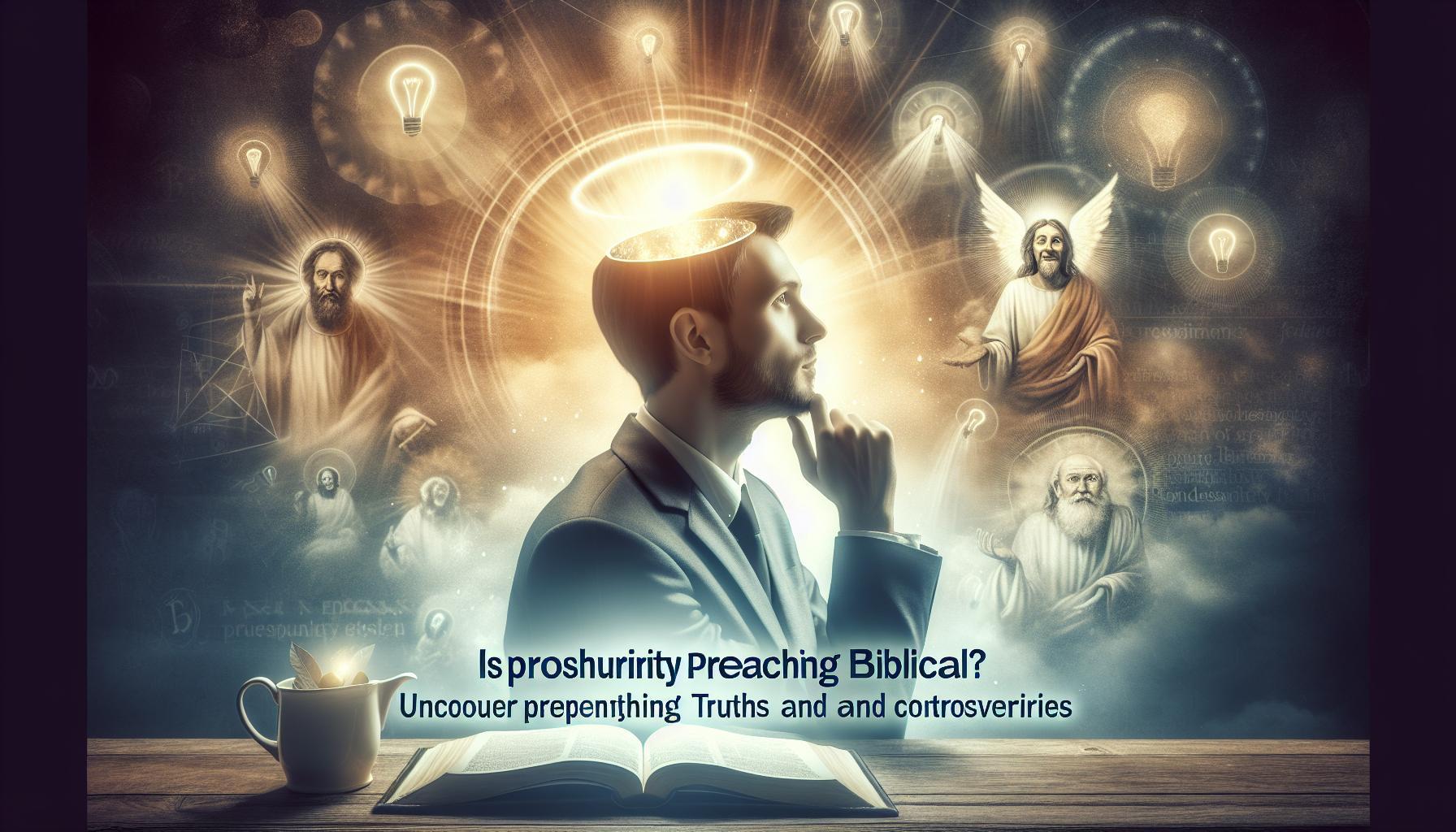Who truly ignited the journey of spreading Christianity? Delving into its origins reveals a fascinating narrative of early influencers and pivotal moments. Understanding the first voices of the faith not only unravels its historical context but also highlights the values that shaped its profound impact on millions around the world today.
The Life and Teachings of Jesus: A Foundation for Christian Preaching
The profound impact of Jesus Christ on Christian preaching cannot be overstated. His life and teachings serve as the bedrock upon which the Christian faith is built. Not only did He articulate messages of love, compassion, and forgiveness, but He also lived them out, providing a model for His followers. Understanding His teachings is essential for anyone exploring the origins of Christianity and its early messages.
The Essence of Jesus’ Teachings
At the heart of Jesus’ teachings is the concept of love—love for God and love for one another. This is encapsulated in His command to “Love your neighbor as yourself,” emphasizing that ethical living stems from genuine compassion for others. Jesus’ teachings, often conveyed through parables, illustrate the values of the Kingdom of God, encouraging believers to exhibit righteousness and mercy in their daily lives. For example, His famous Parable of the Good Samaritan (Luke 10:25-37) illustrates the importance of loving and helping others, regardless of societal divisions.
Furthermore, Jesus urged His followers to embrace forgiveness and reconciliation. His Sermon on the Mount is filled with guiding principles that not only outlined personal ethics but also defined relationships with others and with God. Key phrases such as “Blessed are the peacemakers” (Matthew 5:9) reflect a radical approach to conflict resolution that is foundational for Christian preaching today.
The Role of Parables and Teachings
The use of parables stands out as a significant method in Jesus’ teaching repertoire. These simple stories, laden with profound truths, serve as effective tools for communicating complex spiritual lessons. For instance, the Parable of the Lost Sheep (Matthew 18:12-14) portrays God’s immense love for each individual, illustrating that no one is beyond redemption. Such teachings not only captivated His contemporaries but continue to inspire and inform Christian preaching across generations.
Moreover, Jesus’ emphasis on community and service calls for active participation in alleviating the plight of the marginalized. His instruction to care for “the least of these” (Matthew 25:40) encourages believers to engage in social justice and acts of kindness, shaping the ethical framework of Christian communities.
| Teaching | Scriptural Reference | Application |
|---|---|---|
| Love your neighbor | Mark 12:31 | Promotes community unity and kindness |
| Forgive others | Matthew 6:14 | Essential for personal and relational healing |
| Seek the Kingdom of God | Matthew 6:33 | Encourages prioritizing spiritual growth |
| Serve the needy | Matthew 25:40 | Calls for active compassion in society |
In summary, the teachings of Jesus set forth a transformative vision of life that continues to guide Christian preaching. His messages are not merely historical accounts but living principles that challenge believers to engage authentically with their faith and the world around them. By understanding the depth of Jesus’ teachings and their implications for life and community, one can better appreciate the origins of the Christian message and its enduring relevance today.
The Role of the Apostles in Spreading the Gospel
The profound impact of the apostles in the early Christian movement cannot be overstated. Following the resurrection of Jesus Christ, these dedicated disciples became the torchbearers of a revolutionary message. Their efforts laid the foundation for what would evolve into a global faith, shaping the spiritual landscape of the world as we know it today. As we explore the role of the apostles in disseminating the gospel, it’s essential to recognize not just their actions, but the fervor and dedication that drove them to spread the teachings of Jesus.
Missionary Journeys
The apostles embarked on numerous missionary journeys, each one crucial for the establishment of early Christian communities. Key figures like Paul the Apostle undertook extensive travels throughout the Roman Empire, covering regions such as Asia Minor, Greece, and eventually Rome. Paul’s letters, many of which became part of the New Testament, not only addressed specific issues within these communities but also laid theological groundwork for Christian doctrine. The significance of these journeys can be summarized as follows:
- Geographical Reach: Apostles traveled to diverse regions, incorporating various cultures into the Christian narrative.
- Establishment of Communities: They founded churches that served as anchors for faith and fellowship.
- Communication of Teachings: Through speeches, letters, and personal relationships, they spread Christ’s teachings far beyond their immediate environment.
Personal Testimonies and Miracles
Another pivotal element of their evangelistic efforts was the apostles’ personal testimonies. Witnesses to Christ’s life, death, and resurrection, their firsthand experience endowed their message with authenticity. They performed miracles, as seen in the Book of Acts, which served to validate their claims and draw people to the burgeoning Christian faith. The apostolic approach can be categorized into a few key aspects:
- Evangelism Through Testimony: The apostles shared their personal encounters with Jesus, fostering belief through relatable experiences.
- Acts of Compassion: Miraculous healings and acts of charity demonstrated the love and power of God, appealing to the hearts of the people.
- Cultural Sensitivity: By respecting local customs and incorporating elements of local cultures, they expanded the gospel’s appeal across various demographic groups.
Establishing Leadership and Structure
The apostles also recognized the necessity of establishing a framework to ensure the longevity and sustainability of their mission. They ordained leaders and appointed elders to oversee the growing communities, fostering a sense of order and continuity. As a result, local churches began to flourish, providing spiritual support to believers and helping navigate the complexities of early Christian life. This organizational structure served to:
| Function | Benefit |
|---|---|
| Leadership Development | Ensured effective guidance and decision-making for local communities. |
| Doctrinal Unity | Promoted a consistent understanding of the teachings of Jesus, helping to combat false teachings. |
| Support Network | Established a support system for new believers, fostering a sense of belonging and community. |
Through their relentless commitment and diverse methods, the apostles played an instrumental role in the spread of Christianity. Their legacy, intertwined with the question of “Who was the first person to start preaching about Christianity: Origins,” highlights a transformative period that has left an indelible mark on history. Each apostle’s journey was not merely a quest for belief; it was a movement that called people to a new life anchored in the teachings of Jesus Christ, resonating through the ages to inspire billions around the world today.
Understanding the Early Christian Communities: Where Preaching Began
The roots of Christian preaching are deeply intertwined with the formation of early Christian communities, which served as both the cradle of faith and the launching pad for spreading the Gospel. Following the death and resurrection of Jesus Christ, small groups of believers gathered in homes, public squares, and synagogues, sharing teachings and experiences that laid the foundation for what would become the Christian religion. These initial gatherings ignited a profound movement characterized by passionate preaching and communal worship, shaping the trajectory of Christianity as we know it today.
The Role of Early Leaders in Preaching
In the wake of Jesus’ resurrection, figures such as Peter, Paul, and other apostles emerged as pivotal leaders who boldly proclaimed the message of Christianity. Peter, often recognized as one of the first to preach to the masses, delivered a powerful speech on the day of Pentecost, effectively launching the Christian mission. His ability to connect scriptural prophecy with Jesus’ life captivated listeners, demonstrating how early preaching was rooted in Scripture and deeply relevant to the audience of the time.
Similarly, Paul’s travels and epistles expanded the boundaries of early Christianity, establishing churches across the Roman Empire. His letters not only provided theological insights but also practical guidance for fledgling communities, emphasizing ethical living and the importance of love and unity. The impact of their preaching is evident in the rapid growth of these communities, transforming them into vibrant centers of faith.
The Characteristics of Early Christian Communities
The early Christian communities were marked by several distinctive features that facilitated the spread of preaching:
- Inclusivity: These communities welcomed individuals from diverse backgrounds, promoting a message of universal salvation.
- Shared Resources: Members practiced communal living, sharing possessions, and helping those in need, which reinforced their bonds and attracted new followers.
- Active Worship: Regular gatherings for prayer, teaching, and the breaking of bread created a rhythm of life centered around faith.
- Witnessing to the Faith: Followers were encouraged to share their personal experiences of faith, fostering a culture of evangelism that was vital for growth.
Impact on the Spread of Christianity
The combination of passionate leadership and community engagement created a fertile ground for the spread of Christianity. As these early Christian communities grew, they established a network of interconnected believers, which facilitated the movement of ideas and teachings. The stories of transformed lives and the hope offered through Jesus inspired many to join the faith, often at great personal risk.
| Key Figures | Contributions |
|---|---|
| Peter | First preaching to the masses, emphasizing Jesus’ fulfillment of scripture. |
| Paul | Missionary journeys, letters shaping theology, and church organization. |
| James | Leadership in the Jerusalem church, advocating for Jewish-Gentile relations. |
Understanding these early Christian communities not only sheds light on the origins of preaching in Christianity but also highlights the remarkable ways in which faith, leadership, and community can converge to catalyze profound change. Their legacy continues to inform contemporary Christian practice, underscoring the enduring power of shared belief in fostering growth and spreading hope.
The Influence of Paul: Evangelism and the Early Church
The rapid spread of Christianity in its early days can largely be attributed to the remarkable influence of Paul of Tarsus, a transformative figure whose life and teachings significantly shaped the direction of the early church. Originally a staunch persecutor of Christians, Paul’s dramatic conversion on the road to Damascus marked a pivotal turning point, propelling him not only into the fold of believers but also into a role as one of the most ardent evangelists of the faith. His relentless missionary journeys across the Mediterranean left an indelible mark on early Christian communities and helped to lay the theological foundation for the religion.
The Missionary Journeys of Paul
Paul’s travels took him through various regions, including Asia Minor, Greece, and ultimately to Rome. These journeys allowed him to establish numerous churches and spread the message of Christ. Key elements of his mission included:
- Preaching to Gentiles: Paul pioneered the approach of preaching to non-Jews, broadening the appeal of Christianity beyond its Jewish roots.
- Establishing Congregations: Through his efforts, he founded and nurtured a network of communities that became the backbone of the early church.
- Epistles: His letters to these communities, known as epistles, addressed theological questions, ethical living, and communal issues, serving as important doctrinal texts that continue to guide Christians today.
Theological Contributions
Paul’s writings not only provided practical guidance but also articulated key theological concepts that would define Christian doctrine. His focus on salvation through faith rather than works bridged diverse cultural understandings and emphasized the universal nature of Christ’s message. Some of his core contributions include:
- Justification by Faith: Paul emphasized that faith in Christ, rather than adherence to the law, was the path to righteousness.
- The Role of Grace: He articulated the significance of grace as an unearned gift from God, reinforcing the belief that salvation is attainable for all regardless of their past.
- Unity in Christ: Paul taught that barriers between Jew and Gentile, slave and free, male and female were dissolved in Christ, fostering an inclusive community.
| Key Aspects of Paul’s Influence | Description |
|---|---|
| Evangelism | Engaged in widespread preaching, reaching diverse audiences. |
| Theological Foundations | Established key doctrines that define Christian beliefs today. |
| Community Building | Developed structured yet flexible communities of believers. |
In essence, Paul’s work transcended simple evangelism; it was about creating a framework through which early believers could understand their faith, forge community, and spread the Gospel further. The legacy of Paul remains crucial when exploring who was the first person to start preaching about Christianity: origins and how that preaching evolved into a global movement that continues to thrive today.
Key Figures in Early Christianity: Who Preached and Why
The spread of Christianity in its early days was profoundly influenced by several key figures whose teachings and experiences shaped the direction and message of the movement. Jesus of Nazareth is undeniably the central figure whose life and ministry sparked what would become a global faith. His teachings about love, forgiveness, and the Kingdom of God laid the theological groundwork that would inspire many followers to carry his message forward after his crucifixion.
Notable Early Preachers
- Peter: Considered one of the foremost apostles, Peter was pivotal in the initial spread of Christianity. After the events of Pentecost, where he preached to a crowd in Jerusalem, thousands converted to Christianity. His leadership in the early Church was instrumental in establishing the community of believers.
- Paul of Tarsus: A former persecutor of Christians turned apostle, Paul’s epistles form a significant portion of the New Testament. His missionary journeys throughout the Roman Empire, where he preached to both Jews and Gentiles, expanded the reach of Christianity beyond its Jewish roots. He emphasized that faith in Christ transcended the Jewish law, making Christianity accessible to all.
- James the Just: As a leader of the Jerusalem Church, James played a vital role in addressing the relationship between Jewish traditions and the new faith. His teachings helped guide early Christians on how to integrate their beliefs with existing Jewish laws and practices.
- John the Evangelist: Known for his deep theological insights and the authorship of the Gospel of John, his writings emphasized the divine nature of Christ and the importance of love and community among believers.
These figures contributed to what would later be recognized as key early doctrines and beliefs within Christianity. Their dedication to preaching, teaching, and spreading the Gospel was driven by a shared vision of a faith that transcended cultural and religious boundaries. They met various challenges, including persecution and theological disputes, yet their resolve to spread the message of Jesus remained strong.
Why They Preached
The motivations behind their preaching efforts varied, often interwoven with personal convictions and transformative experiences. For instance, Paul’s dramatic conversion experience on the road to Damascus not only inspired him personally but also fueled his fervor to share the Christian message across different regions. This zeal was paralleled by the experience of many early converts who felt a profound calling to share what they had witnessed and learned from Jesus and the apostles.
Each of these figures employed their unique backgrounds and experiences to address the spiritual needs of their communities, which often included a longing for hope in tumultuous times. The resilience and adaptability of these early preachers were critical in establishing the foundations of what would grow into a diverse and global faith tradition. Their messages not only resonated with their contemporaries but also laid the groundwork for future generations to explore and expand upon the teachings of Jesus, ultimately shaping the evolution of Christianity through the centuries.
The Evolution of Preaching from the Early Church to Modern Times
The history of preaching within Christianity is a rich tapestry woven from various cultural, theological, and social threads. From its inception with Jesus Christ, who fundamentally transformed spiritual teaching through parables and direct engagement with followers, preaching emerged as a primary means of spreading the faith. This evolution reflects not only the changes within church doctrine but also the shifting contexts of society across centuries.
Roots in the Early Church
In the early days of Christianity, preaching was a communal experience, often happening in homes and public squares. The Apostle Paul is one of the first prominent figures noted for his extensive preaching missions, as documented in the Acts of the Apostles. His letters, while not preaching in the traditional sense, served as foundational texts that articulated Christian theology, making them essential to early church teachings. This grassroots approach allowed for the rapid dissemination of Christian beliefs across the Roman Empire, facilitated by Paul’s travels and engagement with diverse communities.
The early church utilized a variety of methods to communicate their messages. Key elements included:
- Storytelling, inspired by Jesus’ own methods
- Public debates with philosophers
- Letter writing to address specific issues within congregations
Medieval to Reformation Shifts
As Christianity became more institutionalized after the Edict of Milan in 313 AD, preaching evolved in response to the needs of a more structured church. The rise of theologians like Augustine and later figures such as Martin Luther saw the pulpit becoming a platform for doctrinal clarity and moral exhortation. The Protestant Reformation catalyzed a significant shift, urging preachers to move from mere ritualistic presentation to a more personal, scripture-focused approach that emphasized the importance of the Bible itself. This transformation changed how congregations engaged with sermons, making them central to spiritual life.
A notable example of this shifting paradigm is the sermon style adopted by Puritans in the 17th century, characterized by its simplicity and focus on personal piety. Unlike the ornate rhetoric of prior ecclesiastical preaching, these sermons were deeply rooted in the text and aimed at fostering individual reflection and communal moral responsibility.
Modern Preaching Techniques
The 19th and 20th centuries witnessed further evolution as preaching began to incorporate elements of oratory and social engagement. Preachers such as Billy Graham utilized mass media, leveraging radio and television to reach vast audiences. This era marked a democratization of preaching, where megachurches and revival meetings made the practice accessible to the general public.
Today, the landscape of preaching continues to diversify with the rise of digital platforms and social media. Preachers can now share messages instantly with global audiences, leading to innovative approaches such as:
- Interactive sermons that engage congregations through social media
- The use of multimedia presentations for enhanced storytelling
- Podcasts and video content that reach beyond traditional church settings
The evolution of preaching reflects larger trends within society and culture, continuously shaped by historical contexts and technological advancements. This dynamic trajectory underscores the significance of understanding who was the first person to start preaching about Christianity, as these early practices laid the foundation for modern methods that continue to adapt in our fast-paced world.
Contextualizing the Message: How Culture Shaped Early Christian Preaching
The early days of Christianity were heavily influenced by the cultural and social contexts in which the message was disseminated. As the apostles began to spread the teachings of Jesus, they encountered diverse populations, each with unique traditions, beliefs, and values. This intersection of cultures played a critical role in shaping the way Christian ideas were presented and understood. Early Christian preaching was not merely a transfer of religious beliefs; it was a complex interplay of communication that addressed the hearts and minds of various audiences.
Embracing Local Languages and Dialects
One of the most significant ways culture influenced early preaching was through language. The apostles often preached in the local dialects of the areas they visited. This accessibility allowed them to reach a broader audience, ensuring that their messages resonated deeply with the listeners. For instance, the use of Aramaic, Greek, and Latin enabled the early church to connect with Jews, Gentiles, and Roman citizens alike. Preachers were adept at using metaphors and examples from everyday life that their audience could relate to, nurturing a sense of connection and understanding.
Incorporating Cultural Practices
In addition to language, early Christian preachers adeptly integrated local customs and cultural practices into their sermons. This approach not only made the teachings more relatable but also helped to establish Christianity within the existing social frameworks. For example, the use of local festivals and communal gatherings facilitated opportunities for preaching. The apostolic message often found itself intertwined with local beliefs, allowing Christianity to enhance rather than dismantle the existing cultural landscape. This strategy promoted acceptance and facilitated smoother conversions.
The Role of Oral Tradition
The significance of oral tradition in early preaching cannot be overstated. Many of the first converts were illiterate, making spoken word crucial for the transmission of Christian teachings. Preachers relied on narrative techniques, storytelling, and parables to share the core messages of Christianity. This method not only engaged the audience but also fostered communal memory among listeners. As stories were passed down, they evolved, adapting to the cultural nuances of each community, ensuring that the essence of the teachings was preserved even as they adapted to different settings.
By examining the dynamics of cultural influences on early Christian preaching, it becomes clear that the message of Christianity was not static but fluid, evolving to meet the needs of various populations. This adaptability was pivotal in the spread of the faith and highlights how the early church navigated the complexities of a diverse world. Understanding these cultural adaptations enhances our appreciation for the origins of Christianity and the foundational role that context played in shaping its early dissemination.
Embracing Diversity: Different Approaches to Preaching Across Denominations
The message of Christianity has traversed centuries, cultures, and communities, evolving through the unique lenses of various denominations. Each group has its own distinctive approach to preaching that reflects its theological principles, cultural backgrounds, and community needs. Understanding the diverse methodologies of preaching can enrich not only one’s own spiritual journey but also foster deeper connections among believers from differing traditions.
Recognizing the Spectrum of Preaching Styles
Christian preaching is not monolithic; instead, it’s characterized by a rich tapestry of styles that can be understood as reflecting a variety of cultural and doctrinal backgrounds. Below are some of the prominent approaches seen across various denominations:
- Expository Preaching: Often associated with evangelical denominations, this method emphasizes a direct, verse-by-verse exploration of biblical texts. The aim is to equip congregations with a deeper understanding of scripture, rooting preaching firmly in the Word of God.
- Topical Preaching: Used by many contemporary churches, this approach involves selecting themes or topics relevant to the congregation’s experiences. It allows for flexibility and adaptation to current societal issues or personal struggles, making the message more approachable.
- Liturgical Preaching: Predominantly found in Orthodox and Catholic settings, this style integrates the sermon within structured worship services. The preaching is often grounded in the liturgical calendar and aims to connect the congregation to the historical traditions of the church.
- Narrative Preaching: This engaging method utilizes storytelling and personal experiences to convey theological truths. It’s common in charismatic and progressive churches, creating a relatable context for the message while inviting listeners into the narrative.
Connecting Across Denominations
While the techniques may differ, the core intent of preaching remains consistent: to share the message of Christ and foster spiritual growth. For instance, missionary work often involves a blend of expository and narrative styles, translating foundational biblical teachings into culturally relevant updates for diverse audiences. Such adaptability is crucial, reflecting the origins of Christianity when early disciples, including those who advanced the preaching of the gospel, engaged different cultures.
This diversity fosters a rich conversation among denominations. Church leaders and congregants can benefit from shared experiences and methods, learning from one another to enhance their preaching effectiveness. Workshops and conferences that focus on diverse preaching styles can be invaluable for ministers seeking new insights and inspiration. Embracing this diversity ultimately leads to a more profound understanding of the Christian faith and its global implications.
Practical Steps for Broadening Preaching Approaches
To effectively embrace the diversity in preaching and create a more enriching environment within your congregation, consider the following steps:
- Encourage collaboration: Partner with other local churches, regardless of denomination, for joint events or discussion panels about preaching methods.
- Engage in cultural research: Understanding the cultural backgrounds of your congregation can directly inform how sermons are crafted and delivered, ensuring they resonate deeply on a personal level.
- Attend workshops: Pursue training that highlights diverse preaching methods and incorporates a mix of contemporary and traditional styles to appeal to a broader audience.
- Solicit feedback: Invite comments from congregants after services to gauge which approaches resonate most and create an ongoing dialogue about effective preaching.
Adopting these methods not only supports growth within individual congregations but also acknowledges the roots of Christianity as it spread across different regions and cultures, continuously evolving from its origins to the varied expressions of faith seen today.
Frequently asked questions
Who Was the First Person to Start Preaching About Christianity: Origins?
The first person to start preaching about Christianity is generally recognized as the Apostle Peter. He was among Jesus’ closest disciples and played a pivotal role in spreading the teachings of Christ after Jesus’ resurrection.
Peter’s preaching began shortly after the events of the Pentecost, when he delivered a powerful sermon that led to the conversion of about 3,000 individuals (Acts 2:41). This moment signifies not just the start of preaching but also the establishment of the early Christian community.
For a deeper understanding of early Christian preaching, you may want to explore our article on the foundations of early Christianity.
What motivated the early followers to preach about Christianity?
The early followers of Jesus were motivated by profound spiritual experiences and a desire to share the teachings of Christ. These motivations were often rooted in personal encounters with Jesus and the belief in His resurrection.
Many of these individuals felt a sense of urgency to spread the gospel, driven by the commandment that Jesus gave them to make disciples of all nations (Matthew 28:19-20). Their passion and commitment forged strong communities centered around faith and service.
Can I learn about the methods of early Christian preaching?
They utilized stories and parables reflective of their Jewish heritage, making connections to familiar cultural contexts to resonate with diverse audiences. This approach helped garner support and foster strong community bonds.
Why does the origin of Christian preaching matter today?
The principles of outreach, community engagement, and spirituality that emerged from early preaching continue to influence Christian ministry today, encouraging believers to share their faith boldly and with compassion.
What role did Apostle Paul play in early Christian preaching?
Paul’s letters and teachings emphasized the grace of God and faith in Jesus Christ, forming the basis for much of Christian theology today. His ability to articulate complex theological ideas helped establish vital early Christian doctrine.
How did societal changes influence early Christian preaching?
As the early church faced challenges, including persecution, the focus on community support and resilient faith became central themes in preaching, fostering a sense of unity and purpose among believers.
What can modern preachers learn from early Christian preaching?
By incorporating personal testimony and addressing contemporary issues, today’s preaching can echo the transformative power seen in early Christian teachings, revitalizing faith and fostering community growth.
Future Outlook
In concluding our exploration of the origins of Christian preaching, we’ve journeyed through the profound influence of early figures and the foundational messages that resonate even today. From Jesus’ teachings to the impactful ministry of the Apostle Paul, it’s evident that the act of preaching is not merely a tradition but a vital expression of faith that has evolved through the centuries.
As we reflect on the rich history and the central tenets of these initial proclamations, consider how they shape our understanding of community, service, and spirituality in our own lives. Whether you’re seeking deeper theological insights or practical applications within your ministry, this exploration invites you to delve further into the scriptures, engage with your faith community, and embrace the diverse tapestry of beliefs that enrich our understanding of Christianity.
We encourage you to continue this journey of discovery—attend local preaching events, participate in discussions, or delve into theological texts to enhance your understanding and nurture your spiritual growth. Together, let us celebrate the vibrancy of preaching as a lifelong calling that inspires and unites all who seek to share the message of hope and love it embodies.




